Sergio Leone

Director • Producer • Writer
Birth Date: January 3, 1929
Death Date: April 30, 1989 — 60 years old
Birth Place: Rome, Lazio, Italy
Often directly associated with the Spaghetti Western, director Sergio Leone was by no means the inventor of the sub-genre, but did more than any other Italian director to popularize it overseas, particularly in the United States. Leone entered filmmaking at the height of popularity for Sword-and-Sandal epics of the 1950s, making his solo directorial debut with "The Colossus of Rhodes" (1961). Once that genre fell out of favor over the massive budgets, he joined a group of Italian directors who reinvented the Western, turning the genre on its head with films that were gritty, violent and often darkly humorous.
For his part, Leone employed a number of techniques like extreme close-ups, rapid-fire editing, punctuated score, and laconic characters in a trilogy of films - "A Fistful of Dollars" (1964), "For a Few Dollars More" (1966) and "The Good, the Bad and the Ugly" (1967) - that reshaped the modern Western and turned a little-known actor named Clint Eastwood into a star. All three films were derided by critics for their then-excessive violence while also becoming major international box office hits. Leone followed with what many felt was his Western masterpiece, "Once Upon a Time in the West" (1968), and later spent over 10 years making his four-and-a-half hour long gangster epic, "Once Upon a Time in America" (1984). When he died in 1989, Leone left behind a legacy as a pioneering director whose influence was felt throughout generations while inspiring a permanent shift of the cultural landscape.
Born on Jan. 3, 1921 in Rome, Italy, Leone was raised by his father, Vincenzo Leone - who went by the name Roberto Roberti - a silent film director who directed one of Italy's first Westerns, and his mother, Edvige Valcarenghi, a silent film actress who retired not long after she married. Growing up surrounded by the movie business, Leone naturally developed an affinity toward filmmaking and set his sights on becoming a director at a young age. After dropping out of university, where he was studying law, Leone began working as an assistant director on Vittorio De Sica's neorealist "Bicycle Thieves" (1948) and amassed a number of Italian productions onto his résumé during the late 1940s and early 1950s, including the MGM Sword-and-Sandal epic, "Quo Vadis" (1951), starring Robert Taylor and Deborah Kerr.
Leone's entry into directing came when he was named assistant director on Mario Bonnard's Italian epic, "The Last Days of Pompeii" (1959), which Leone also co-wrote. When Bonnard fell seriously ill during production, Leone took over and finished filming, though he later refused to accept credit. It would be Bonnard's final film. Meanwhile, Leone made his solo directorial debut with "The Colossus of Rhodes" (1961), a grandly visual, but badly dubbed Sword-and-Sandal epic about a Greek captain (Rory Calhoun) who must travel to the island of Rhodes to destroy the large brass statue that spews molten lead at attackers. Not his best known film, "Colossus of Rhodes" nonetheless displayed occasional cinematic mastery that would later define his best films. Meanwhile, the expense of Sword-and-Sandal epics proved to be too costly for both Hollywood and Italian filmmakers, and they soon fell out of style.
While Hollywood struggled in the mid-1960s, Italian cinema exploded with the invention of the Spaghetti Western, an originally derogatory term for Italian-made Westerns that became international box office hits and were routinely mimicked by generations of filmmakers. At the center of the pioneering genre was Leone, whose name soon became synonymous with them. Drawn by the strength and simplicity of the West's uncomplicated men, Leone set about making what became known as his "Dollars Trilogy," three violent and gritty Westerns that revolutionized an ailing genre and turned a little-known B-actor named Clint Eastwood into an international star.
It all started with "A Fistful of Dollars" (1964), an unofficial remake of Akira Kurosawa's "Yojimbo" (1961) that depicted Eastwood as the laconic Man with No Name, an aimless drifter who comes upon a town torn apart by two warring families and hires himself out as a mercenary to them until both are destroyed. One of the first Spaghetti Westerns to be released in the United States, "A Fistful of Dollars" became the highest grossing film in Italy at that time and went on to become a hit in the States as well. Despite the film's international success, Leone ran into legal trouble when Kurosawa and his producers successful sued for compensation. In fact, the settlement allowed Kurosawa to make more money from Leone's film than he did with his own original.
Meanwhile, Leone worked overtime to get Eastwood - who had yet to see the first film - to commit to the sequel, "For a Few Dollars More" (1966). But when he saw a rushed print that was entirely dubbed in Italian, Eastwood readily agreed to again play the nameless drifter, who this time is a bounty hunter who forms an uneasy partnership with a rival (Lee Van Cleef) to track down a wanted bandit (Gian Maria Volontè). Once again, the film became an international hit.
But the best and most well-known film in Leone's "Dollars Trilogy" was "The Good, the Bad, and the Ugly" (1967), a massively successful movie that redefined the genre and influenced generations of filmmakers, including The Coen Brothers and Quentin Tarantino. The ultimate Spaghetti Western, "The Good, the Bad and the Ugly" follows three gunslingers - Eastwood (The Good), Lee Van Cleef (The Bad) and Eli Wallach (The Ugly) - who search for a hidden cashbox filled with Confederate coins while traveling the bleak landscape and maneuvering through the violence of the Civil War.
Along with the other two films in the Dollars Trilogy, "The Good, the Bad and the Ugly" was panned by U.S. critics for its excessive violence, even though audiences flocked to theaters in droves. But as with the other two films, time changed opinions considerably and the film was later considered to be one of the best Westerns ever made. Of course, it's style - which consisted of extreme close-ups, exaggerated violence and Leone's childhood friend Ennio Morricone's haunting score - was long after mimicked in a number of films, shows and even commercials.
Despite the success of the trilogy, Leone and Eastwood had a falling out which stemmed from the actor's intolerance of the director's unrelenting perfectionism. The director offered him the lead for his next classic, "Once Upon a Time in the West" (1968), but Eastwood declined and Leone set about finding another actor. He turned to Charles Bronson, whom the director had originally wanted to play the Man with No Name in "A Fistful of Dollars." Bronson played a mysterious, harmonica-playing gunman who teams with an outlaw (Jason Robards) to protect the wife (Claudia Cardinale) of a slain landowner ruthlessly murdered by a sadistic killer (Henry Fonda). A major hit in Leone's native Italy, "Once Upon a Time in the West" was greeted by critical scorn in the United States and became a box office flop. But once again, time saved the film's reputation and it went on to surpass even "The Good, the Bad and the Ugly" as being one of Leone's finest achievements. He went on to direct "Duck, You Sucker!" (1971), which was also known as "A Fistful of Dynamite," which starred Rod Steiger as a Mexican outlaw and James Coburn as an Irish mercenary who join forces to rob a bank.
Leone was set only to produce the film, but original director Peter Bogdanovich left after a dispute. Tired of directing Westerns, Leone placed his assistant director behind the camera, only to feel the wrath of his two stars, who wanted him to direct. He finally relented and produced a quality film that nonetheless failed to compare favorably to his previous four efforts. After turning down the opportunity to make "The Godfather" (1972), which eventually went to Francis Ford Coppola, Leone instead focused on his own gangster epic that eventually took over 10 years to make, "Once Upon a Time in America" (1984). Leone's sprawling epic about four Jewish mobsters in New York was a stunning, non-linear masterwork that chronicled David "Noodles" Aaronson (Robert De Niro) and his three Lower East Side friends who grow up to become ruthless gangsters in the 1920s and 1930s, only to suffer the fate of those who choose a life of crime and violence.
Moving fluidly through four decades with flashbacks, dream sequences and opium-induced visions, "Once Upon a Time in America" - which also starred James Woods, Elizabeth McGovern and Joe Pesci - was a commentary on the mythology of gang violence in America that displayed an intellectual depth and emotional resonance unsurpassed by other crime dramas. Originally clocking in at an overwhelming four hours and 29 minutes, the film was was a larger-than-life masterpiece that aspired to be much more than the sum of its parts. It was praised at the Cannes Film Festival and across Europe, though Leone was forced to cut a significant chunk to appease distributors. He later cut the film down to two hours and 19 minutes for its U.S. release, which made it almost incomprehensible. Though Leone embarked on a series of unrealized projects, he would never direct another film. A compulsive overeater who became obese later in life, Leone suffered a heart attack and died on April 30, 1989. He was 60 years old.
By Shawn Dwyer
Credits

Once Upon a Time in America

Gianni Minà. Cercatore di storie

Wilde Western-Woche

Wilde Western-Woche

Pane dal cielo

Timeline

Historia de nuestro cine

Historia de nuestro cine

Movie Mag

Wonderland

Community Spotlight

Questo è il giardino

Kings Of Ads / 巨匠たちのCF

Troppo forte
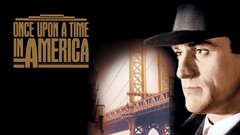
Once Upon a Time in AmericaStream

Once Upon a Time in AmericaStream

A Genius, Two Friends, and an Idiot

A Genius, Two Friends, and an Idiot
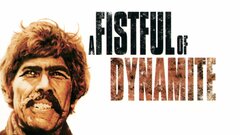
A Fistful of DynamiteStream

A Fistful of DynamiteStream

Once Upon a Time in the WestStream

Once Upon a Time in the WestStream
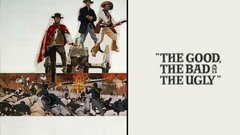
The Good, The Bad And The UglyStream

The Good, The Bad And The UglyStream
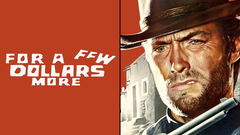
For a Few Dollars MoreStream

For a Few Dollars MoreStream

A Fistful Of DollarsStream

A Fistful Of DollarsStream
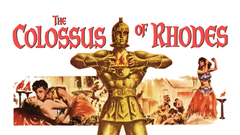
The Colossus of RhodesStream

The Last Days of Pompeii

Quai des illusions






